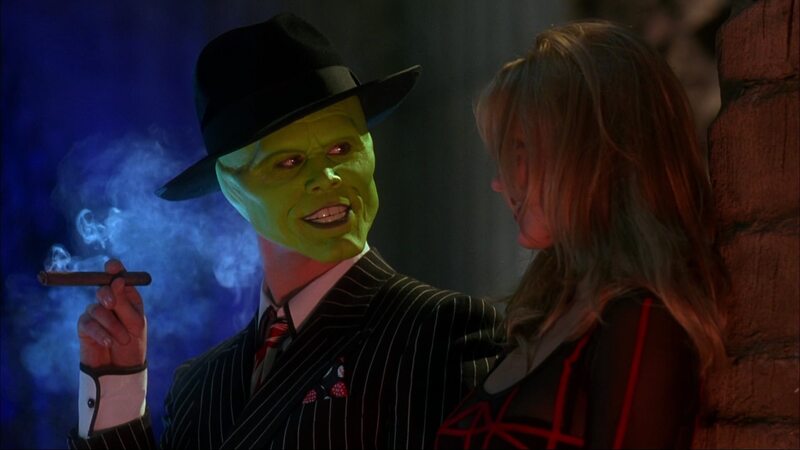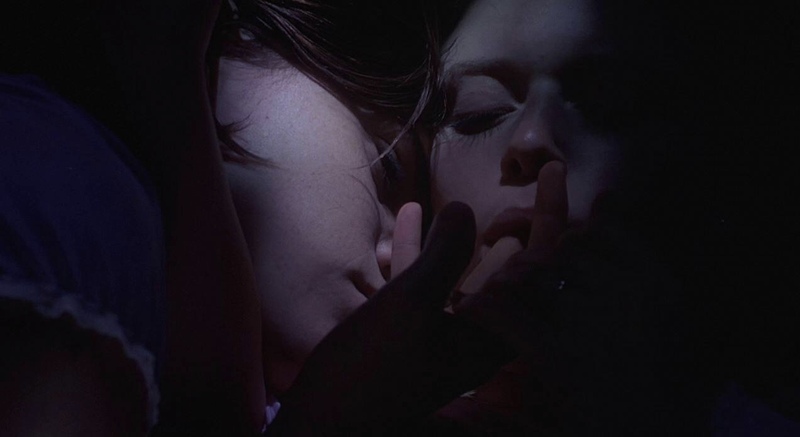
Spectacle That Never Forgets the Person Inside
MOVIE REVIEW
The Mask [Limited Edition]
–
Genre: Comedy, Fantasy, Superhero
Year Released: 1994
Runtime: 1h 41m
Director(s): Chuck Russell
Writer(s): Michael Fallon, Mark Verheiden, Mike Werb
Cast: Jim Carrey, Cameron Diaz, Peter Greene, Peter Riegert, Amy Yasbeck, Richard Jeni
Where to Watch: available November 11, 2025, pre-order your copy here: www.arrowvideo.com, www.mvdshop.com, or www.amazon.com
RAVING REVIEW: THE MASK is the rare studio comedy that fully understands its star as both actor and special effect. Jim Carrey’s face, posture, and body language were already a cultural event in 1994; this film turns that energy into its own premise. Stanley Ipkiss is a pushover with a kind heart and a habit of apologizing for occupying space. The mask he finds doesn’t create a different person; it detonates the person he’s been holding back, then paints him green and lets him sprint across the screen. That simple idea—your repressed self, set free—is what gives the movie its lasting power. The jokes go big, the gags go bigger, and yet the concept remains clear enough to anchor all the chaos.
Carrey splits the role in two without ever losing the thread of Stanley's identity. As the “zero,” he’s precise: small laughs that he swallows, hesitation you can see in his shoulders, a smile that works too hard to soothe everyone around him. As the “hero,” he’s a walking exclamation point—whiplash, cartoon takes, double takes, and a con artist’s joy in showing off. The performance works not because the green-faced tornado is funny on its own (it is), but because you always feel Stanley under the paint. Even at his wildest, he’s still the lonely guy who loves cartoons and dreams of stepping out of his own way.
Cameron Diaz’s debut is a reminder that charisma can be a plot device all by itself. As Tina Carlyle, she isn’t merely the love interest; she’s the person who makes Stanley stumble over words and the Mask pile on swagger. Diaz plays Tina with an easy self-possession that complicates her position in a gangster’s sight. She’s the eye of the hurricane—the reason the Mask crashes a club, the reason Stanley tries to be brave without it. Diaz’s presence hints at a deeper future for the character than the movie often suggests; still, she makes every scene feel brighter.
Chuck Russell directs like someone staging live-action Looney Tunes. The film leans into practical stunts and then enhances them with early-’90s CG in ways that still charms. The trick is restraint: the effects aren’t there to replace performance but to extend it. Carrey’s face stretches and his body snaps like a rubber band, but those flourishes feel like punctuation at the end of jokes he’s already sold. The result is a film that moves with constant momentum, shaped around set pieces that showcase the Mask’s anarchic showmanship: a whirlwind nightclub conga, a musical plea to the cops, an improvised shimmy away from goons.
What keeps THE MASK from floating away on pure gimmickry is how clearly it articulates the fantasy at its center. Stanley doesn’t want power for domination; he wants the freedom to be seen. The green alter ego grabs attention the way a neon sign does. It’s loud, brash, and shameless—everything Stanley thinks women, bosses, and bouncers respond to. The movie has fun with that, but it doesn’t pretend the Mask is a cure. When the bravado fades, Stanley must still choose courage without a magical artifact. That small choice—be a better version of yourself, not a louder one—keeps the story from collapsing into a string of sketches.
The antagonists are intentionally simple. Peter Greene’s Dorian is a blunt instrument in a nice suit, a threat designed to make the Mask’s antics collide with real danger. Peter Riegert’s Lt. Kellaway is the cop who sees only the mess and misses the man, which lets the film stage one of its best running gags: the Mask talking his way out of trouble by turning the police into an audience. Amy Yasbeck’s Peggy Brandt, a reporter with questionable ethics, adds a cynical twist to the film’s world of performance and persona; even outside the Mask, everyone’s chasing a version of themselves that plays better in public.
As a comic-book adaptation, THE MASK takes a gentler route than its darker source material, steering toward buoyant spectacle rather than grim satire. That makes sense for a comedy built around a rising star. It embraces the innocence of its premise—transform the timid into the unstoppable—and populates it with supporting players, action, and a romantic thread that gives the second half a genuine stake. The pacing is brisk by design; jokes don’t linger, and scenes button themselves with a flourish before overexplanation can drain their spark.
The movie earns its spot in the era’s comedy zeitgeist because it understands spectacle as an extension of character. The green suit, the zoot hat, the yellow tie, the trumpet, the snap of a cane—they’re not just props. They’re shorthand for the swagger Stanley thinks he needs. The film’s best moments push past that illusion—when the Mask pauses to notice Tina as a person rather than an audience, when Stanley chooses to protect rather than perform, when Milo steals a key with more grace than any human in Edge City. Those beats lend warmth, keeping the last act from feeling mechanical.
Revisiting THE MASK now, what stands out is how cheerful it is about identity without preaching. It suggests that we all wear faces to get through the day and asks what might happen if one of those faces ran wild. The answer is often ridiculous, sometimes romantic, and occasionally touching. That mix is the movie’s true sweet spot. It never tries to turn its premise into an essay; it simply lets the idea animate the comedy and trusts the audience to connect the rest.
THE MASK remains a showcase for a singular performer, a launchpad for a future star, and a reminder that style can be a story when it’s aligned with character. It’s not flawless, but it’s consistently entertaining, inventive in ways that still charm, and anchored by performances that sell the magic without diminishing its impact. For a film about a guy who becomes a walking exaggeration, it lands on something unexpectedly sincere: confidence earned is more satisfying than confidence borrowed.
Bonus Materials:
4K ULTRA HD BLU-RAY LIMITED EDITION CONTENTS
4K restoration of the film from the original camera negative by Arrow Films, approved by director Chuck Russell
4K (2160p) UHD Blu-ray presentation in Dolby Vision (HDR10 compatible)
Original DTS-HD MA 5.1 audio, lossless stereo audio, and a brand new Dolby Atmos mix
Optional English subtitles for the deaf and hard of hearing
Archive audio commentary with Chuck Russell
Archive audio commentary with Chuck Russell, New Line co-chairman Bob Shaye, screenwriter Mike Werb, executive producer Mike Richardson, producer Bob Engelman, ILM VFX supervisor Scott Squires, animation supervisor Tom Bertino, and cinematographer John R.
The Man Behind the Mask, a newly filmed interview with Chuck Russell
From Strip to Screen, a newly filmed interview with Mike Richardson, Mike Werb, and Mark Verheiden
Green Faces Blue Screens, a newly filmed interview with visual effects supervisor Scott Squires
Sssssssplicin’!, a newly filmed interview with editor Arthur Coburn
Ask Peggy, a newly filmed interview with actor Amy Yasbeck
Toeing the Conga Line, a newly filmed interview with choreographer Jerry Evans, featuring never-before-seen rehearsal footage
Terriermania, a new video essay by critic Elizabeth Purchell on canine sidekick Milo
Archival featurettes Return to Edge City, Introducing Cameron Diaz, Cartoon Logic, What Makes Fido Run, The Making Of, on-set interview bites with the cast and director, and B-Roll footage
Deleted scenes, with optional commentary by director Chuck Russell
Theatrical trailer
Image gallery
Reversible sleeve featuring two original artwork options
Illustrated collector’s booklet featuring new writing on the film by Alexandra Heller-Nicholas and original production notes
Double-sided fold-out poster featuring two original artwork options
Six postcard-sized reproduction artcards
Please visit https://linktr.ee/overlyhonestr for more reviews.
You can follow me on Letterboxd, Instagram, Twitter, and YouTube. My social media accounts can also be found on most platforms by searching for 'Overly Honest Reviews'.
I’m always happy to hear from my readers; please don't hesitate to say hello or send me any questions about movies.
[photo courtesy of ARROW VIDEO, MVD ENTERTAINMENT]
DISCLAIMER:
At Overly Honest Movie Reviews, we value honesty and transparency. Occasionally, we receive complimentary items for review, including DVDs, Blu-rays, CDs, Vinyl Records, Books, and more. We assure you that these arrangements do not influence our reviews, as we are committed to providing unbiased and sincere evaluations. We aim to help you make informed entertainment choices regardless of our relationship with distributors or producers.
Amazon Affiliate Links:
Additionally, this site contains Amazon affiliate links. If you purchase through these links, we may receive a commission. This affiliate arrangement does not affect our commitment to honest reviews and helps support our site. We appreciate your trust and support as you navigate these links.



Average Rating